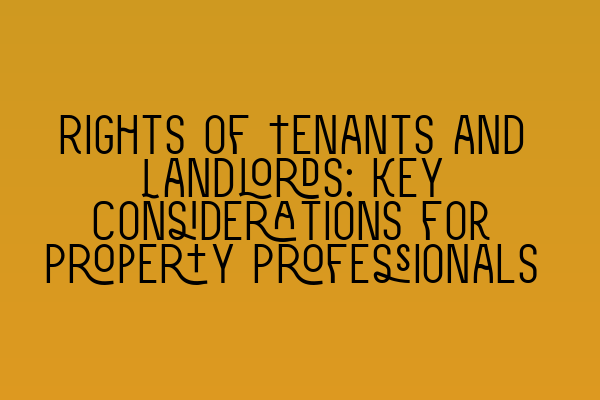Rights of Tenants and Landlords: Key Considerations for Property Professionals
As a property professional, it is crucial to have a solid understanding of the rights of both tenants and landlords. This knowledge not only helps you navigate legal complexities but also enables you to provide valuable guidance to your clients. This blog post will explore the key considerations regarding the rights of tenants and landlords and highlight the importance of staying up to date with the ever-changing landscape of property law.
1. Understanding the Tenants’ Rights
Tenants have a variety of rights that protect them throughout their tenancy. It is essential to familiarize yourself with these rights to ensure you can advise your clients accordingly. Some of the key rights of tenants include:
– Right to a safe and habitable property: Under the law, landlords have a legal obligation to provide tenants with a safe and well-maintained property. This includes ensuring the property meets health and safety standards and is free from hazards.
– Right to privacy: Tenants have the right to enjoy their home without interference from the landlord. Landlords must provide reasonable notice before entering the property, except in cases of emergency.
– Right to fair treatment: Tenants are protected against discrimination based on characteristics such as race, gender, religion, disability, or family status. It is essential for landlords to adhere to these laws to avoid legal repercussions.
– Right to quiet enjoyment: Tenants have the right to peaceful enjoyment of their rented property. Landlords must not interfere with the tenant’s use and enjoyment of the property without proper cause.
2. Understanding the Landlords’ Rights
While tenants have a set of rights, landlords also have rights that protect their interests. As a property professional, it is essential to understand these rights in order to provide comprehensive advice to your clients. Some of the key rights of landlords include:
– Right to receive rent: Landlords have the right to receive rent payments from tenants as outlined in the lease agreement. It is crucial for landlords to clearly define the terms and conditions regarding rent payment in the tenancy agreement.
– Right to enter the property: Landlords have the right to enter the property for inspections, repairs, or in case of an emergency. However, proper notice must be provided to the tenant, except in emergencies.
– Right to evict: In certain situations, such as non-payment of rent or violation of the tenancy agreement, landlords have the right to evict tenants. However, this must be done in accordance with the legal requirements and procedures outlined by the relevant authorities.
– Right to terminate the tenancy: Landlords have the right to terminate a tenancy agreement at the end of its term or for reasonable cause. It is essential for landlords to follow the legal procedures for ending a tenancy to avoid potential legal disputes.
3. Staying Up to Date with Property Law
Property law is a dynamic field that is constantly evolving to reflect the changing needs and expectations of both tenants and landlords. As a property professional, it is crucial to stay informed about the latest developments in property law to provide accurate and up-to-date advice to your clients.
One way to stay updated is by regularly referring to trusted sources of legal information, such as legal journals, news articles, and online legal resources. Additionally, attending relevant conferences, seminars, and professional development courses can help you stay abreast of the latest trends and changes in property law.
By staying informed, you can ensure you are providing the best possible service to your clients, while also avoiding potential legal pitfalls.
Conclusion
Having a solid understanding of the rights of tenants and landlords is essential for property professionals. By familiarizing yourself with these rights and staying updated with the latest developments in property law, you can provide valuable guidance to your clients and ensure compliance with legal requirements.
At SQE Property Law & Land Law, we understand the importance of staying informed and up to date. That’s why we offer comprehensive SQE 1 and SQE 2 preparation courses to help aspiring property professionals navigate the complexities of property law. Check out our related articles to learn more about practice exams, mocks, and exam dates.
Contact us today to enhance your knowledge and excel in the field of property law.
